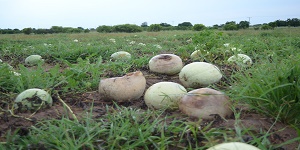 Watermelons rotten on the farm
Watermelons rotten on the farm
Watermelon, an essential seasonal fruit that adds to the nutritional basket of the country, is in season, but, again, farmers of the crop are losing out due to the lack of storage facilities and access to ready market.
Large quantities of the juicy fruit rot away under trees along the major streets in the Dangme East District, where the crop is predominantly cultivated.
At Matsekope, one of the farming communities in the district, where watermelons are produced in large quantities, some farmers are ploughing the rotten crop back into the soil to prepare the land for the tomato and pepper season.
Emmanuel Kofi Akrofi has four acres of the crop which has rotten on the farm due to lack of buyers.
According to him, all the investments made in ploughing the land and buying chemicals and fertilisers have gone waste. However, his concern now was not so much on his loss: he wants the fruit off the land so he can start a new planting season.
“Now I am not even concerned about how cheap the market women will buy it for; all I want is to get them off the land so that I can start transplanting my tomato seedlings”.
He said although the cultivation of the crop holds a great potential for farmers in the area to make good returns, post-harvest losses and lack of buyers have for years been the bane of watermelon farming in the area.
The crop is planted two times in a year: between January and March against the minor rainy season, and from September to October during the major rainy season.
The lucky farmers who are able to make some profit on their produce are those who take the risk to plant even before the early rains.
The early planters are able to ‘grade’ the fruits, with the biggest, which they refer to as ‘Grade One’, going for GH?5 on the farm.
Like most rural farmers, these farmers are at the mercy of the pricing of middlemen for their produce. Although watermelon farming is capital-intensive, from land preparation through planting to harvesting, it attracts very little in terms of pricing by the middlemen.
When in a full season, the fruit is sold in truckloads. The truck is fully loaded and a price is bargained.
On the farm, a large size of the fruit goes for as low as 20 pesewas, but the majority never make it out of the farm.
When Weekend Finder visited some of the farms, the farmers were ploughing back the fruits into the soil to begin transplanting their tomato and pepper seedlings.
One farmer who only gave his name as Isaac said he had to plough four acres of the crop back into the soil because there were no buyers.
On another farm, the farmer was busy harvesting the melons to the roadside for them to rot so he can plough the land for the new planting season.
Gabriel Tetteh Apronti, Chairman of the Matsekope Co-operative Association, told Weekend Finder that due to poor rains that affected farming in the area, resulting in lower crop yields, farmers saw watermelon cultivation as an opportunity to break even.
He lamented that due to the unavailability of a facility to process the watermelons, farmers count their losses each year.
“The same happens to our tomatoes because the middlemen buy it cheap on the farm, and the rest are left to rot”, he lamented.
He recounted that government promised to set up a processing factory at Sizakope, one of the farming communities in the district, some time ago, but the project has since been abandoned.